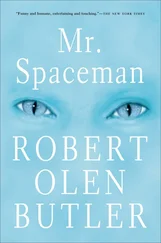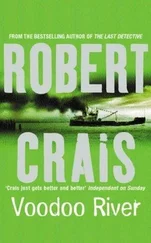“I don’t hear any sarcasm in that,” Robert says.
“There isn’t any.”
“Is she a flower child?” Robert says. “Teaching you gentleness?” He regrets it at once. No matter that he’s starting to hear Jimmy’s tone as an affectation, a lie. It’s still a better way for them to talk, surely.
Jimmy doesn’t answer. His cheeks twitch slightly and release, twitch and release. He’s grinding his teeth.
If a woman is indeed gentling his brother down, the attitude deserves nurturing. So he makes himself a little vulnerable to his brother, offers an admission. “He isn’t showing it.”
Jimmy stops working his jaw. “I don’t follow,” he says.
“Pops,” Robert says. “His approval. He was never going to actually show it. We both know that.”
Jimmy furrows again, briefly, and grunts a nod of sympathetic recognition.
“My decision was my own,” Robert says.
Jimmy nods again, in assent, looks away, beyond Robert to the square. They are silent for a few moments. Then Jimmy says, still looking into the distance, “She’s bringing it out in me.”
Now Robert doesn’t follow.
Jimmy turns his face to him, sees his puzzlement.
“Gentleness,” Jimmy says. “She’s only bringing something out in me that’s already there.” He pauses, then adds, “And she’s not a flower child.” This last, however, comes out devoid of gentleness. Not quite angry, but sharply firm. Still, in an earlier time, Jimmy would be in full-flighted umbrage now.
Robert says, “I didn’t mean to insult her.”
“It wouldn’t be an insult anyway, if she were,” Jimmy says.
Robert thinks: If you didn’t take it as an insult, you wouldn’t have hardened up in the denial. But he doesn’t let it out quite that way. He says, “I was just asking. Trying to assess what degree of criminal you both think I am by putting on this uniform.”
“I thought you were asking to source my gentleness.”
“Those two things often go together these days. The gentleness and the judgment.”
“We’re judging a government.”
“By embracing another,” Robert says. “North Vietnam’s oppressions are even institutionalized. Read a little history. No government, no country in this world has spotless hands.”
A quick clench comes to Jimmy’s face, furrowing his brow and tightening the margins of his eyes. But he unloosens at once. His forehead stretches tight in willed calm.
Robert finds this oddly touching. His brother is still working hard to please his girlfriend.
“I won’t argue Vietnam with you,” Jimmy says. “Personally, I can’t stand the politspeak and jargon and sloganeering. I can’t stand the drug-addled vapidness either. But I’m sorry for the war coming to our family like this. I am.”
“It will come to you, as well.” Robert says this softly, not as a willed effect but from an ache that he is surprised to feel this keenly. He has even brushed aside his brother’s implicit rebuke. Talk was starting that graduate school deferments were about to vanish. The war could come quite personally to his brother next May.
Jimmy does not answer. But he does not look away. He and Robert hold their gaze for a long moment. Then, as if they’d spoken of it and agreed, the two of them turn and continue south on Third Street.
They will not speak again about the war. Not on this day. Not, as it turns out, ever again.
In his mind now, in his bed, Robert has had enough.
The room is cold.
He wants his first cup of coffee.
He draws back the covers.
He sits, puts his feet on the floor.
But he has come this far on Labor Day, 1967, and the rest of it must play through him so he can drink his coffee with the past relegated once more to the past.
Much of that final scene is a blur. It wasn’t about him, after all. He was simply a witness, standing apart. He’s not even sure where they all are in the house. He can see only Jimmy and Pops. They’re shouting at each other. Likely they’re in the kitchen, because Mom walks out, brushing past Robert. He should follow her. But he doesn’t.
He stays, though for a long while only in body. He tunes out the words, as Jimmy is drawn by his father into the politspeak he said he despises. High-decibel politspeak that goes on and on.
Until abruptly the voices cease.
For a moment the room rings with silence.
Robert takes notice.
Jimmy and Pops are standing close, facing each other.
And then Jimmy begins to speak, but softly.
Robert listens. He misses some of the words, but he gets the gist. It’s about a murderous war. It’s about those who defy their country. Then Jimmy’s voice rises and Robert hears clearly: “Those are the real heroes.”
And William raises his right hand and slaps his son across the face. Jimmy’s face jerks away from Robert’s view.
The gesture has been flash-powder fast and William’s hand has vanished. Robert’s mind is lagging way behind. He saw what happened, recognized it. But Jimmy has quickly brought his face back to his father’s, and for a moment Robert doubts his senses, wonders if he saw correctly. For all his bluster and working-class manliness, Pops has almost never used his hands on his sons.
And it happens again. Robert sees a movement at William’s left shoulder and hears a sharp sound and Jimmy’s face jerks this way, showing itself to Robert. Pops has struck him with his other hand, and he barks a single word: “Cowards.”
Robert’s body is startled into immobility while his mind revs up to understand. And it comes to him: It’s General George Patton, Pops’s beloved high commander. It’s Patton’s infamous gesture in a field hospital in Sicily in 1943, slapping a shell-shocked soldier across the face as a cowardly malingerer. The press got hold of it and Eisenhower stepped in, reprimanded Patton, took him out of combat command for a crucial year. Pops has spoken more than once about the bum deal this war hero got for a righteous act. Pops absorbed this gesture over the years. His muscles memorized it. And finally what seemed a familiar circumstance reflexed it.
All this tumbles through Robert’s head as more words are spoken from across the room, as Jimmy then moves away, as he passes Robert, whose body is still inert. Nothing in Robert’s thoughtful understanding of the situation suggests what action his body might take.
Jimmy is gone from the room. He will continue out of the house. He will not return.
It’s all over. The end.
But for Robert in his father’s kitchen, and for Robert in his own bedroom, what ended was simply that Labor Day in 1967. Jimmy would go on to his senior year at Loyola. It would be ten months before he’d go to Canada.
What Robert does not see at the time and what he does not see now is Jimmy’s face after the second slap. The blow brought Jimmy’s eyes to Robert’s. But at that moment Robert was seeing only what was in his own head: an imagined image of Patton slapping a mind-blasted soldier in a hospital ward; Pops sitting somewhere with a beer, bemoaning Patton’s unfair fall from grace.
Robert missed Jimmy’s eyes fixed on him, missed what they asked.
And so he puts the incident away, as he always has: Everything happened very quickly; there was nothing to be done; it was all about these other two men anyway.
Robert rises from the bed.
Soon, in the kitchen, ready for the morning in khakis and cardigan, Robert burr-grinds his coffee beans, trying to return fully to this house, to the winter morning, to a day of work ahead in an America of a century ago. To do so he considers this Ethiopian he is grinding as if he were a Starbucks Foundation Endowed Professor of Coffee writing a monograph on these complex beans, washed and sun-dried in a cooperative in the village of Biloya, grown in deep shade more than a mile high in the surrounding mountains by a thousand farmers on less than two acres each, a coffee comprised of a dozen heirloom varieties, Kurume and Wolisho and Dega and more. Roasted last week in Durham, North Carolina, just a little past medium, the beans just beginning to turn dark.
Читать дальше












